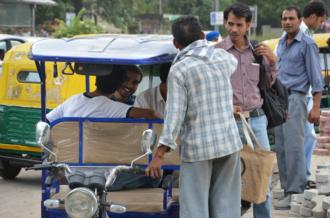Regulation threatens India’s e-rickshaws
Once hailed as a green solution to New Delhi’s congestion, electronic rickshaws may be nearing the end of the roads.

New Delhi, India – A small green revolution on the congested roads of New Delhi may stall following signs that electric rickshaws could be regulated.
State transport authorities are scrutinising a report indicating that many drivers of the estimated 100,000 “e-rickshaws” now circulating the congested Indian city are souping them up to make them more powerful – and faster.
With one traffic fatality already attributed to the environmentally friendly vehicles, transport police want them brought under greater control – prompting critics to warn this will force drivers off the streets.
“If they come under the law, and there are extra expenses, on top of the battery and repairs, then there’s no life ahead for it,” said e-rickshaw dealer Anil Kumar.
Transport solution
It was with much fanfare last year that e-rickshaws were introduced to New Delhi’s roads with the blessing of the state government as an affordable and environmentally friendly solution to the city’s transports woes.
The vehicle has transformed the lives of drivers such as Mohammed Rafique who just a year ago sweltered in New Delhi’s 40C-plus heat as he peddled a cycle rickshaw to earn about 15 to 45 cents for each passenger.
Now, he waits for passengers in the shade of the tarpaulin of a new electric rickshaw.
“This one’s better,” he tells Al Jazeera with a broad smile as he leans on the handlebars of the vehicle. “It takes less effort to drive. This will last longer too.”
Rafique is not the only one who appreciates the new wheels.
“Passengers prefer this one because they travel faster,” he points out. “And with peddling you can only take two people, it takes longer, and sometimes they arrive late.”
Lack of regulation
Advantages aside, it was not long before critics – and competitors – took aim at the new vehicles.
Hari Shankar Das, a driver one of New Delhi’s gas-powered rickshaws which until last year were the only motorised rickshaws allowed, insists he does not mind the competition from e-rickshaws that normally charge less.
“Our problem is that they not being treated the same as we are,” says Das.
“They don’t get fined, they have no licence plate. We need to have registration, and we can be fined by police,” he complains.
 |
| E-rickshaw drivers, mostly unskilled, worry about the future [Faiz Jamil/Al Jazeera] |
It is a point even noted by Delhi’s High Court.
Under the city’s Motor Vehicle Act, an electric vehicle with a 250W battery or less which cannot exceed speeds of 25 km/h are exempt from normal traffic laws – meaning traffic police are powerless to take action against e-rickshaws.
This lack of regulation, which has further clogged Delhi’s already notoriously chocked roads, prompted the High Court to order the government to address the loophole.
“Our hands are tied,” says Anil Shukla, assistant commissioner of Delhi’s traffic police.
He says his officers are legally unable to fine e-rickshaw drivers for flouting traffic rules – even for erratic or dangerous driving.
“It’s not a fossil-fuel consuming vehicle. So it doesn’t fall under the classic category of ‘vehicle’…so it’s a little legal tangle that is stopping us,” Shukla says.
Nonetheless, he says the Delhi government is looking at a recently published study indicating that many e-rickshaws have been upgraded.
“Instead of the normal 250W, the study has found that some of these are running with upwards of 800W to 1,000W batteries, and some even with 1,400W,” Shukla says.
As a result, some e-rickshaw drivers have been seen clocking up speeds of up to 60 km/h – which Shukla says would give them the status of a vehicle and put them under his officers’ authority.
End of a brief era
Those in the industry assembling e-rickshaws out of parts coming from China that has sprang up – such as Kumar – now fear regulation will kill off their livelihoods.
“People like these because you don’t need lessons, there’s no traffic problems, and you don’t need a permit,” Kumar says.
“If these come under traffic rules, it’ll be hard to get people to drive them.”
Many e-rickshaw owners rent their vehicles for about US$6 a day, but Kumar says the added expense of registration, insurance and being licensed to drive the vehicles will be too much.
Moreover, running e-rickshaws may not be as environmentally friendly as their supporters claim.
Kumar admits more wattage than the permitted 250W is needed to carry passengers and so many e-rickshaws are illegally using more powerful batteries – and points out an unsavoury truth about these “green” vehicles: the batteries cannot yet be recycled.
“Use and throw,” he says. “After six or seven months, only the battery goes bad. Right now there’s no recycling for them. You have to put in a new battery.”
This means harmful chemicals and metals end up in the garbage that in India can be discarded anywhere – from parks, streets and landfills to waterways.
Many e-rickshaw owners also live in unauthorised neighbourhoods that lack permits for utilities, meaning that recharging the vehicles – which takes up to 10 hours – is done using illegal electrical connections that put a strain on the power grid.
E-rickshaw drivers – most of whom came from unskilled, menial jobs before getting behind the handlebars – are also growing concerned about the future.
Rafique, who rents his vehicle, says he does not want to go back to a cycle-rickshaw and that banning e-rickshaws will be unfair for those who bought them and rent them.
“What will the poor people who drive these do if they get shut down having spent all that money to buy them?” he says.
“The government will have to do something for them. What will shutting us down do?”
Follow Faiz Jamil on Twitter: @faizreports